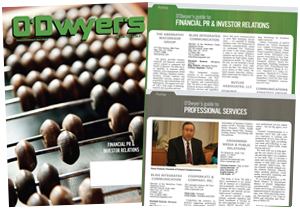|
|
You’re the head of communications for a public corporation in the manufacturing sector that has been public for a year. You’re responsible, among other things, for sharing the corporation’s story with audiences that matter. You’re doing everything right. Then the unexpected occurs.
Until then, things had been going well. The investor relations function reports to you instead of the CFO. The CEO is smart, directed, always forthcoming when asked questions by employees, customers and investors. Analysts have more or less gotten the growth story, and the company has delivered on its promises made at the time of its IPO.
Then, on a Friday afternoon in the heat of summer, a tragic workplace shooting occurs at neighboring business in the same manufacturing park where your company holds important operations. Your CEO is on the phone with the CEO of that company to express concern, when a major blast rips through your own company’s plant next door. You help gather the crisis team, which, on a Friday afternoon in the summer, is in multiple locations. You determine that it appears multiple employees have been lost and your plant will be off-line for an undetermined amount of time.
|
|
You help the company do all the right things. You and the CEO embark on the company jet immediately to the location. You advise the CEO to meet and thank local first responders. You and the crisis team set up an emergency effort to meet the needs of employees’ families. Senior executives, including the CEO, reach out to key customers and assure them that the company will increase output at other locations and product availability and service will not be significantly affected.
Your general counsel and risk manager handle the insurance end. You manage multiple on-site television crews. And you field media calls from around the world. Was it terrorism? Was it sabotage? Why were the two CEOs on the phone at the time of the blast, a fact leaked to the press? The Department of Homeland Security says publicly, within the first day, that there were no signs of terrorism. You are told not to comment further.
In general, you believe the company and the CEO have done everything right. Employees seem appreciative; the affected families are saddened but grateful of the support; customers are, for the most part, satisfied. The town’s mayor is glad to hear that the company will rebuild. The CEO is satisfied with the outcome so far.
Now what about the investors?
Just as it seems that all crises happen on a Friday afternoon, it also seems major crises also happen close to a quarterly earnings call.
That’s the case in this scenario. The CEO, who has visited with each of the affected families, holds a town hall meeting for employees, and pledges employees will be reassigned or given paid leave during reconstruction of the plant. But now that CEO faces a different audience.
He tells you he wants his call script to focus exclusively on all that has been done for the families, for the town, for the industry. He tells you that, out of respect for the deceased and their families, the call should deviate from its normal financial scripting and focus exclusively on the story: how he flew to the site, how impressed he was regarding the fighting spirit of the employees and this town. And indeed, he wants to show that he’s the right leader at a time of crisis. He reasons that the financials in the earnings release and the 10-Q that will be published later that day “speak for themselves” and should be all that analysts and investors need.
It’s a well-intentioned but misguided reaction we have seen many times.
You write this script. The CEO says it captures everything he wants it to say. You tell him the press will pick up on his comments, and that’s a good thing, because it demonstrates humanity and a can-do spirit. However, as the CEO’s strategic communications advisor, you also express concern that investors may have their own questions. The executive team backs the CEO and agrees that this is not the time for financial discussions.
The CEO reads his script and opens the call for Q&A. The questions, all hard-hitting, set the company on its heels:
“It looks like the quarter showed good momentum but, in light of this incident, will this momentum continue?”
“How will this incident affect the annual guidance you affirmed last quarter? Can you reaffirm? What about next year?”
“Is there enough capacity among the company’s other plants to meet customers’ demands?”
Analysts’ reports issued immediately after the call are critical of the company’s approach, and accuse the corporation of not being forthcoming. The stock drops ten minutes into the call. At the end of the day, it has fallen 10%. The CEO tells his executive committee that Wall Street is heartless, something he knew before but now sees writ large.
The trade press covers the stock drop. Major customers are now getting nervous.
What happened?
Clearly, the company made a critical mistake in believing the actions and messages that worked so well for other audiences were sufficient for investors. As a strategic communications advisor, you know that while every audience hears the same words, Wall Street has different, specialized needs in times of crisis. To navigate the crisis dialogue with investors, the company must be proactive in anticipating and responding to their number one question: “How will this affect my earnings model?”
Investors need to know that the CEO is in control. They need to know that a small, empowered team is handling the crisis, and management remains committed to running the company and conducting business as usual. They need to be reassured.
It’s a special skill to balance these audiences in a time of crisis when information is fluid. Part of that skill is to know and anticipate what investors need to hear.
The ultimate test of crisis management is that over time the issue is absorbed by Wall Street and does not, over time, reflect the valuation or the overall reputation.
* * *
Rhonda Barnat and Mike Pascale are Managing Directors at Abernathy MacGregor.




 Edelman handles Viking Holdings, the river and ocean luxury cruise line that plans to raise $1B via an IPO priced in the $21 to $25 per share range.
Edelman handles Viking Holdings, the river and ocean luxury cruise line that plans to raise $1B via an IPO priced in the $21 to $25 per share range. Teneo is handling the initial public offering of CVC Capital Partners, one of Europe’s largest private equity firms with nearly $200B in assets under management.
Teneo is handling the initial public offering of CVC Capital Partners, one of Europe’s largest private equity firms with nearly $200B in assets under management. Brunswick Group represents Endeavor Group Holdings as it agrees to go private via its acquisition by Silver Lake technology investment firm, which is handled by Edelman Smithfield.
Brunswick Group represents Endeavor Group Holdings as it agrees to go private via its acquisition by Silver Lake technology investment firm, which is handled by Edelman Smithfield. Tod Donhauser, a nine-year veteran of Edelman, has joined H/Advisors Abernathy as managing director and head of its San Francisco office.
Tod Donhauser, a nine-year veteran of Edelman, has joined H/Advisors Abernathy as managing director and head of its San Francisco office. Intelligent Group Ltd, a Hong Kong-based financial PR firm, has priced its initial public offering of 1.9M shares at $4, which is the low end of the $4 to $5 range.
Intelligent Group Ltd, a Hong Kong-based financial PR firm, has priced its initial public offering of 1.9M shares at $4, which is the low end of the $4 to $5 range.


 Have a comment? Send it to
Have a comment? Send it to 
No comments have been submitted for this story yet.